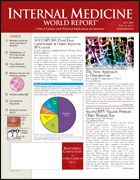Publication
Article
Internal Medicine World Report
Vitamin D Deficiency Increases Overall Mortality Risk
Author(s):
By John Schieszer
Harald Dobnig, MD
TORONTO, Canada—It is well established that vitamin D has a role in bone health, and recent evidence suggests it may prevent some types of cancer. Now new data from a large study show that serum vitamin D levels also play a significant role in overall health and may help predict an individual's risk of death, investigators said at the annual meeting of the Endocrine Society. In this study, vitamin D deficiency nearly doubled the risk of death compared with adequate levels of vitamin D.
Of the more than 3200 men and women (mean age, 62 years) included in the study, 65% had serum vitamin D levels below the normal range. All the patients were followed for >5 years on average, and 611 patients died during the study period.
Those with the lowest vitamin D levels were at a 2.5-fold greater risk of death than those with adequate vitamin D levels. Even after adjusting for risk factors that are independently associated with death (ie, poor heart and kidney function, physical inactivity, diabetes, smoking), mortality risk was still elevated almost 2-fold.
"This research shows that vitamin D has an impact on overall health status much more than has been appreciated," said lead investigator Harald Dobnig, MD, professor of endocrinology at the Medical University of Graz, Austria.
Vitamin D deficiency is a growing problem worldwide. This study suggests that low levels of this vitamin may be an important independent predictor of overall and cardiovascular mortality.
Mechanisms relating to the handling of oxidative stress and cell adhesion may be involved in the translation of this effect, the researchers suggest.
All the patients in this study were part of the Ludwigshafen Risk and Cardiovascular Health Study, which included white men and women who underwent coronary angiography. Two thirds had major heart disease, and at least half had narrowing of the coronary arteries. But even the patients without heart disease had an increased risk of death if they had low vitamin D levels.
According to Dr Dobnig, serum 25-hydroxyvitamin D, which is derived mainly from sun exposure and less from nutritional intake, was the type that most strongly predicted the risk of death in this study. 25-Hydroxyvitamin D is considered the hallmark value for determining vitamin D status.
Vitamin D and DNA Health
In a separate study also presented at the meeting, high serum levels of vitamin D in women were associated with a reduction in DNA shortening, a known risk factor for myocardial infarction.
Shortening of telomeres, the DNA string at the ends of chromosomes, occurs in age-related conditions, such as cardiovascular disease, in men and women. When telomeres get too short, it can result in cell death.
IMWR
"Telomeres are the end pieces of DNA; they seem to protect DNA from damage. It has been shown that as each cell replicates, the telomere length is shorter and eventually reaches a critical length, which may lead to cell death," Brent Richards, MD, a Fellow in Endocrinology and Genetic Epidemiology at King's College, London, told . "So telomere length may function as a biological clock, letting your cells know how old you are."
This study included 1968 female twins, whose ages spanned from 18 to 79 years. The investigators controlled for the effects of other factors known to influence telomere length, such as age, weight, physical activity level, and smoking.
Women whose vitamin D levels were in the highest third had telomere lengths that were equivalent to those of women more than 4 years younger who had vitamin D levels in the lowest third. Dr Richards postulated that sufficient vitamin D levels, which are believed to influence the immune system, may alter aging chromosomes, which, in turn, may affect age-related diseases.
"This research suggests that a vitamin that can be easily and safely modified may decrease the risk of age-related telomere shortening. However, our results do not yet indicate whether vitamin D supplementation can prevent telomere shortening or age-related diseases," he said.
Numbers for highest/lowest vitamin D levels per quartile are being withheld until publication of this study.





